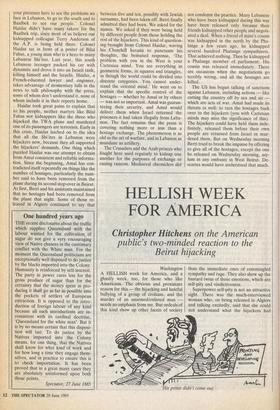HELLISH WEEK FOR AMERICA
Christopher Hitchens on the American public's two-minded reaction to the Beirut hijacking
Washington A HELLISH week for America, and a ghastly week, too, for those who like Americans. The obvious and proximate reason for this — the hijacking and hateful bullying of a group of civilians, and the murder of an unarmed/enlisted man — needs no emphasis from me. But ordeals of this kind show up other facets of society than the immediate ones of commingled sympathy and rage. They also show up the bastard twins of these emotions, which are self-pity and vindictiveness.
Superpower self-pity is not an attractive sight. There was the much-interviewed woman who, on being released in Algiers and talking excitedly, said that she could not understand what the hijackers had
'His prints didn't come out
against New Jersey. New Jersey, the gar- ' den state. Home of construction moguls and one of the continent's finest turnpikes. Who could have a down on it? What do these rag-heads want anyway? And who recalls that a rather large battleship of that name was lobbing shells the size of cadil- lacs into the suburbs of Beirut only a short time ago?
Even to mention such things is the moral equivalent of treason. It is 'making excuses' for the terrorists. So is the recollection that the United States invaded Lebanon in 1958, expressly to rescue a sectarian system from trouble with its Muslim underclass. As for 1982, when Washington let General Sharon re-make Lebanon in a more orderly image, that is ancient stuff. Even in March this year, when a CIA car bomb exploded outside the home of Sheikh Mohammed Hussein Fadlalah, missing him and killing 80 other people, is a thing of the past. His 'Party of God' may be holding four or more Amer- icans as I write, but that doesn't stop history from beginning yesterday. To hint otherwise is to hint that the state of affairs in Lebanon might be at least partly our fault. You would think that the 'hard line' had never been tried.
Let's see now. On a television chat show with me, Paul Weyrich lent his authority as a close Reagan adviser to the idea that we should bomb Syria. A senior Newsweek correspondent advocates bombing Libya. Someone from the American Spectaior, for a change of pace, comes out for the bombing of `kebanon', whatever that may entail. The Wall Street Journal editorialised that the proper and clever course would be to select this moment to invade Nicaragua. And you could probably get a pretty hefty popular consensus for the bombing of the non-Acropolis bits of Athens. Yet the same public opinion polls reveal, when different questions are asked, that most people favour negotiations of some kind, consider the rescue of their fellow-citizens as the first priority, and do not want to risk American lives or soldiers in rescue or retaliation missions. This state of affairs, with the public very strongly in two minds, has so far enabled Reagan to behave like Carter without being derided as Carter. (In any case, as most who favour this analogy tend to forget, Carter was already despised by wide. sections of the electorate long before the seizure of the Tehran embassy, and despised in a way that Reagan is not.) To hear the President say, at a highly- organised news conference, that retaliation would be 'an act of terrorism in itself' was to gasp. To hear him say that the Israelis held their Shi'a prisoners in defiance of international law was staggering. What happened to 'standing tall'?
It has not been at all a good week for the Israelis. First came the President's implied condemnation. Second came pleas from the hostages and their families for the release of the Lebanese detainees. Third came an article (again in the Wall Street Journal) saying that some of the hijackers were kith and kin to the prisoners held in Israel. All this had the unsettling effect of making the sky-pirates seem like members of the human race, with intelligible com- plaints.
Kipling is not especially highly-prized as an author here, but since the question of danegeld keeps coming up one can at least recall how the famous poetic injunction begins:
It is always a temptation to an armed and agile nation To call upon its neighbours and to say We invaded you last night — we are quite prepared to fight Unless you give us gold to go away.
Pecuniary demands don't really enter into it on either side, but that strikes me as a better description of Israel's attitude to Lebanon than of the relationship of Shi'a Islam to the United States. The question that therefore raises itself, in a confused and haphazard way, is this. What price will Americans pay, or be prepared to bear, for their association with Israel as a regional power? Those who say that 'giving into terrorists' only ensures more terror must be conscious of sounding good. But Israel refuses even to recognise the PLO, and can hardly be accused of surrendering to the demands of Arab guerrillas. Yet she seems to have a way of attracting their attention. Everybody knows that, whatever the out- come, this will not be the last hijack. But will it be the last one where everybody repeats the same slogans? • Most maddening of all, and the real source for the fluctuations in public opin- ion, is the relative uselessness of America's giant arsenal. The United States might as well be Austria of Finland for all the effect of its fleets and jets (except that if it were Austria of Finland it would not be able to afford its one-sided policy in the region). One is reminded of Richard Nixon's most eloquent and self-pitying remarks, which passed into the language from his 1968 acceptance speech, about America becom- ing 'a pitiful, helpless giant'. To see the generals and the experts appear on televi- sion night after night, and to see them visibly pucker and droop when they are asked who they can hit, or what they can do, is like watching a dying elephant. And one can't be rid of a slight sense of indecency in pointing out the antecedents of the crisis. It seems smart-alecky or like being a bad winner. Nasty work in fact — but someone has to do it.
Will the retaliatory instinct triumph over the tendency to amnesia and the desire, natural even to superpowers, for a quiet life? I am writing this as late on Tuesday 25 June as I dare, and I think the following. By kicking the harmless boy sailor to death, and by allowing themselves to be filmed up close by my friend Charlie Glass and others, the actual participants in the hijack have probably condemned them- selves to be hunted down and finished off. Calls for a death list, which have come from Congressmen of both parties, are otiose. There already is a death list, and there is the capacity to turn it from a contingency plan into a reality. If Mr William Casey's CIA car bomb had not gone off so disastrously in March, we might already have seen something of the kind, and of course there is still a high probabil- ity that, as with the Israeli 'Wrath of God' operation after Munich, a lot of mis- identifying and random screwing up will result.
That will probably be all, if the remain- ing Americans get out unharmed and give press conferences saying that Israel should never have taken the 700 Shi'a hostages. But if any more of them are hurt, let alone killed, the public opinion will cease to want it both ways and will clench into a fist.
Would Mr Reagan, arch practitioner of the art of crowd pleasing, then drop his statesmanlike tone? The chance must be very good that he would. He can take only so much taunting, either from the hijackers or the Republican Right.
This would make it pointless to ask if retaliation is what the hijackers want.
They, or their neighbours, would get it regardless. At the ceremony for the return of the boy's coffin, which was held at Andrews Air Force Base, the President said that when we all get to heaven we will find the gates protected by a detachmen of United States Marines. Never mind the 250 he has already sent there from Beirut — with this guy the Party of God has met its match.




























































 Previous page
Previous page